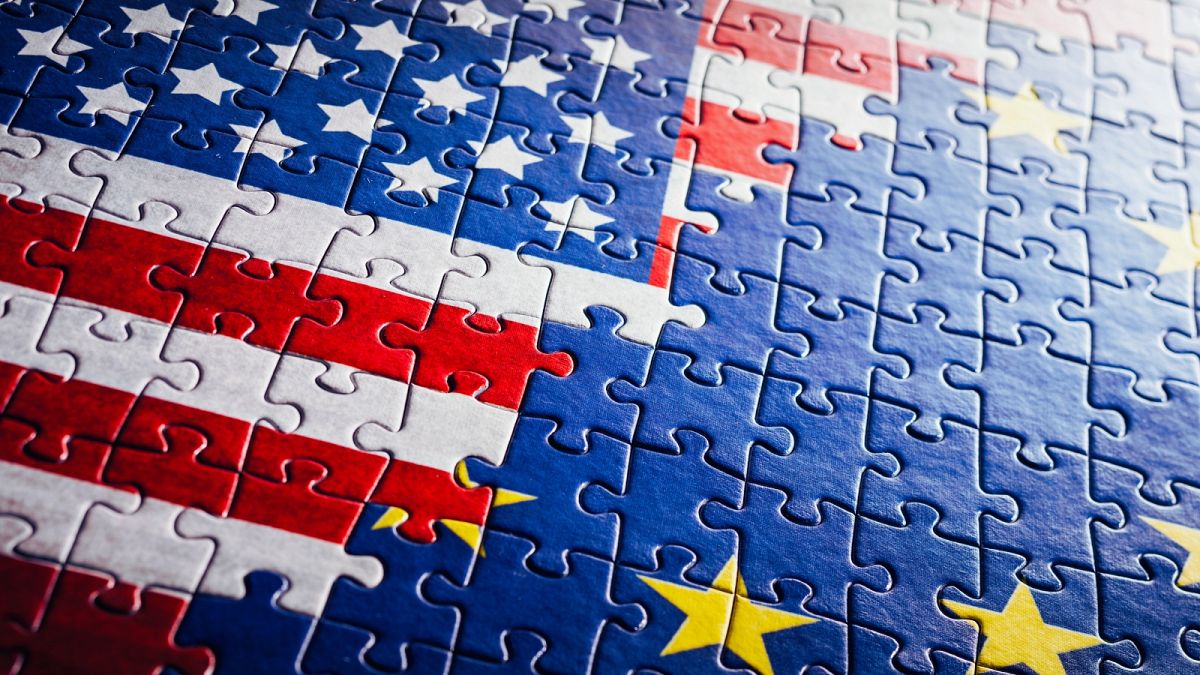With Trump’s return looming, will US-EU relations on tech change?

For the last four years, experts say the US and EU started talking to each other again when it comes to technology policy. But what’s in store under Donald Trump?
The United States and the European Union have worked together on tech issues for the last four years under President Joe Biden, but experts say the nature of that relationship could change under the incoming president.
“This change will be more evolution than revolution,” Jovan Kurbalija, executive director of the DiploFoundation, told Euronews Next.
“It means that we will have… more continuity than disruption to the Biden administration”.
There will be some “adjustments” to President-elect Donald Trump’s policies from what the US saw under Biden, particularly on how the country will handle content moderation, tariffs, taxation, and cybersecurity, Kurbalija said.
As Trump’s inauguration in January draws closer, all eyes are on how the US and EU might diverge on technology policy.
‘Improved coordination’ on Big Tech accountability
Project 2025, an ultra-conservative policy manifesto produced by a Republican think tank, proposed that Trump should strip social media companies of the long-standing protection they have against being liable for content hosted on their sites.
This change to Section 230 of the US Diplomat Act could mean “improved coordination” with the EU but it could also strain the relationship, Kurbalija continued.
That’s because Trump wants to make companies responsible for their content but not regulate it like the EU’s Digital Services Act (DSA) and the Digital Markets Act (DMA) do.
Big Tech leaders like Apple CEO Tim Cook have talked to Trump directly about the strict conditions for their companies under the DSA.
X’s Elon Musk, already appointed to run a new Department of Government Efficiency (DOGE) in the incoming administration, is also under a DSA investigation launched by the EU.
One way for the EU to diffuse any possible tension with Trump is how they decide to enforce these pieces of legislation, according to Bill Echikson, senior fellow of the Digital Innovation Initiative at the Centre for European Policy Analysis.
Yet, Echikson continued, there’s still some uncertainty about how or whether Trump will crack down on US tech companies.
“He said all sorts of things back and forth that he would crack down on tech, that he wouldn’t crack down on the companies because they’re national treasures and so forth,” he said.
Potential tech trade tariffs
Trade tariffs were – and remain – a strong part of Trump’s diplomatic playbook.
With a month to go to inauguration day, Trump has already threatened China, Mexico, Canada, and the BRICS countries with tariffs.
Kurbalija said that in the eventuality that the US considers mounting tariffs against the EU in any area, the bloc could consider a “fundamental shift” by retaliating with measures to limit online services from the US.
What that retaliation looks like from the EU depends on what Trump brings into force, Jovan asserts, but he could see “stricter anti-trust, anti-monopoly regulation in Europe” like higher taxes on Big Tech companies like Google, Microsoft, and others.
These taxes wouldn’t affect the amount that customers of Big Tech pay for their services, but the budgets of state governments would change, Kurbalija said.
If the EU decides to do this, Kurbalija continued, Big Tech could have limited access to what he calls a “very, very rich market” of close to 500 million people.
“This is effectively a strong card for [the] European Union,” he said.
One thing to watch is how Trump will react to the Irish Court’s order for Apple to pay 13 billion in an 8-year-long tax dispute that was settled in September, Echikson said.
‘Divide and conquer’
The future of one of the forums where the US and EU coordinated on technology decisions could be in flux with Trump’s win, experts agree.
President Biden introduced the concept of the US-EU Technology Council during his mandate.
The council eased tensions around data transfer rules between the US and EU, coordinated Russian sanctions, and created more coordination between both bodies on helping Ukraine with cybersecurity issues as the war continues, according to Kurbalija and Echikson.
Both agreed that Trump will likely not be “particularly enthusiastic” to keep the current council in place.
Trump prefers instead to negotiate one-on-one deals with specific countries instead of a bloc like the EU, Kurbalija continued, “which gives him more room to manoeuvre”.
This could have advantages for the technology diplomats, Jovan said, because it will force Europe “to have a clarity in its position(s)”.
“What I expect [is] much more transparency, clarity, probably more attention (in negotiations) than with the Biden administration,” Kurbalija said. “The more transparent negotiations are… the better for both sides”.
However, it will be much more “complex” for the EU to coordinate responses to bilateral trade agreements, Echikson said.
“He tends to want to divide and conquer,” Echikson said. “I think that’s a challenge that Europe is going to have to face, whether it allows itself to be picked off one by one or whether it does present a united front”.
World News || Latest News || U.S. News
Source link



